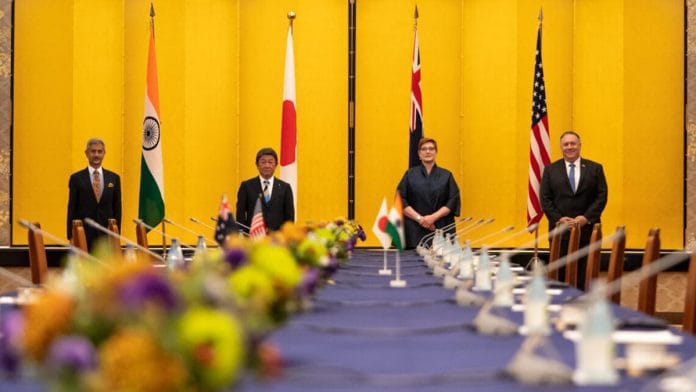The Chinese Navy has been expanding its footprint in the Indian Ocean for the past many years to further its agenda of expansionism.
One of the reasons why the Chinese would like to dominate the Indian Ocean is the Malacca Strait. However, this also keeps their economic prosperity at gunpoint as at any time the US and Indian navies can block it. To minimise this fear, the Chinese are working to create a naval base at Gwadar, Pakistan.
China would like to keep India engaged along the Line of Actual Control (LAC) and check whether it would be successful in impeding maritime capabilities of the Indian Navy. This is because China’s economic welfare is sea-dependent.
India, meanwhile, should get all its economic resources to have 200 warships, which is a requirement of the Navy. This is essential to balance Chinese Navy’s increasing presence in the Indian Ocean.
What Quad can do
In the meantime, the ‘Quad’ or the Quadrilateral Security Dialogue has to stand up to and deter the Chinese because Beijing will continue its bullying tactics in the Indo-Pacific region.
What Quad countries — US, Australia, India and Japan — can do, within their limits, is to divide the Indo-Pacific framework into four areas of responsibility among themselves for maritime patrolling.
Japan should take care of the northern part of South China Sea, the US should take care of the Pacific coast up to Malacca Strait, the Australians should look after the Malacca Strait and the Indians should manage the Indian Ocean Region.
When the top political leadership of the Quad countries meets, the military should give them a clear agenda on how maritime patrol can be divided between the four countries for the purpose of taking responsibility for the Indo-Pacific region.
During an LAC crisis, for instance, Quad countries should alert their respective maritime patrol aircraft and start patrolling the area.
It is also imperative for Quad to include the South East Asian nations. This is necessary for strategic purposes so that the Indo-Pacific becomes a dangerous area for the Chinese as it is a benign place for them now.
Therefore, to observe a change in the Chinese behaviour, maritime deterrence is the only way of the future.
Also read: Has India spoilt the party for China ahead of CCP’s 100th anniversary? What Xi won’t say
Need to move away from ‘free and open Indo-Pacific’
Currently, Quad is a diplomatic coalition. Diplomacy is good but not enough. It is necessary to move away from this diplomatic line called ‘free and open Indo-Pacific’ because it helps China.
China is the biggest user of the Indo-Pacific. So, diplomatically Quad countries should not say ‘free and open Indo-Pacific’ because the security of the sea lines is an old strategic concept propagated by historian and US Naval officer Alfred T. Mahan at the turn of the 19th century.
So the Mahan concept of defending sea lines should be rejected and one must craft an offensive punitive strategy, which will bring the hegemonic China to follow international rules.
As China becomes increasingly assertive, one can’t allow the country to retain its security of sea lanes. The Indo-Pacific is in the interest of the Chinese (in terms of sea lines). Quad is a coalition and not an alliance like NATO, where an attack on one, is an attack on everyone.
The 2020 Malabar Exercise with smaller numbers of ships won’t be a cause for worry for the Chinese. What is required is that the decision-making process evokes fear in Beijing, and for this, a Malabar type of exercise with 30-40 ships must be deployed.
Jay Desai is a second-year student of MA, international relations, at Pandit Deendayal Energy University, Gandhinagar.
Also read: Indian & Chinese infantry soldiers begin moving back from Kailash Range south of Pangong Tso







can’t believe this one didn’t win the first prize while blatant propaganda, lies, inaccurate, cherrypicked, poorly researched hitjob of an article by that person won.
yes